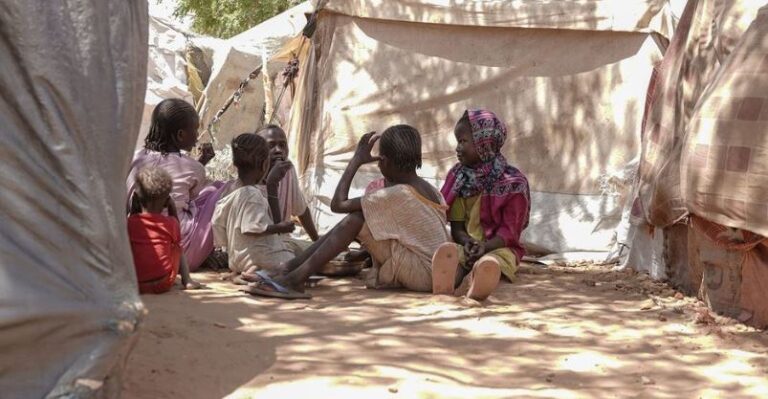Displaced people in Al-Kuma locality in North Darfur State are enduring severe humanitarian conditions due to ongoing conflict. Many fled to Al-Kuma from Al-Fasher amid continuous clashes, daily artillery bombardments, and a deteriorating security situation.
Al Kuma is a locality located about 70 kilometers east of Al-Fasher, the capital of North Darfur State. It is situated on the main Western Inqaz Road which connects Darfur to the Sudanese capital, Khartoum.
Salih Obaid Harireen, head of the emergency committee in Al-Kuma locality, told Radio Tamazuj Tuesday, “The locality is hosting approximately 45,000 displaced people in 23 shelters across several schools, kindergartens, and tents. They are living in dire conditions with severe shortages of food and shelter materials.”
Salih expects the situation to worsen, especially with the onset of the rainy season and the scarcity of drinking water, compounded by the locality’s remoteness. He noted that the price of a barrel of water has reached 4,000 Sudanese pounds, a sum that most families cannot afford.
“There is also a severe shortage of life-saving medicines such as insulin. Due to airstrikes on the city, some people have been forced to live in valleys,” said Salih. He highlighted that aid to the displaced has been provided solely through committee member contributions, with no organizational intervention, stressing the urgent need for immediate action to prevent a catastrophe.
Displaced person Abdullah Saeed from Al-Tijania neighbourhood in Al-Fasher reported that upon arriving in Al-Kuma, they were met with kindness from local residents and authorities and are currently residing in schools. He stressed the dire need for humanitarian assistance.
Nasr Al-Din Mohammed Ibrahim, another displaced person from Al-Fasher, stated, “The humanitarian situation is extremely dire for most of the displaced, who urgently need food, medicine, clothing, and shelter materials, amidst the absence of organizational support.” He called on organizations to provide aid.
Sabah Rabih Ahmed Salih, a displaced person from Al-Fasher now in Al-Kuma, reported severe hardships, including food shortages, lack of healthcare, drinking water, child vaccinations, and soaring prices of goods and services.
She emphasized the increased suffering with the onset of the rainy season and the absence of medicines and mosquito control measures. She called on international, regional, and national organizations to intervene and provide essential services to mitigate the crisis.
The number of people internally displaced in Sudan due to the ongoing war could soon exceed 10 million, the United Nations migration agency said recently, in the world’s largest displacement crisis.
Fighting broke out in Khartoum in April 2023 and quickly spread across the country, reigniting ethnic bloodshed in the western Darfur region.




